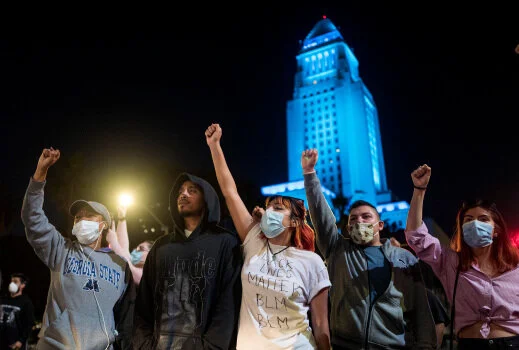Art Is Activism (And We Need It)
Michael T. Oakes
Art has always been a reflection or commentary of the culture it comes out of. Art has always been a way to speak truth to power and theatre specifically is at its best when it does exactly that. Theatre has a rich history of taking real-life incidents, dramatizing them, and subsequently making the audience truly look at the world around them. Now more than ever that is hugely important. When theatre returns, I implore theatres to tap into this history and having strong activist pieces in their season.
The pandemic is not ideal but came at a good time in terms of the landscape of the past month. Theatre has had plans, shows, and seasons canceled in mass. This allows time to restructure and re-plan the season they had planned to better reflect the turn our social climate has taken. It gives theatre an opportunity to do something wildly important, amplify BIPOC voices. Amplify them on stage, backstage, and in the planning offices. Do plays written by BIPOC and not just traumatic ones that make the white audiences think.
One of the biggest absences in theatre has been that of positive person of color stories being told. Think of your favorite play by a person of color. One, do you have one? Two, is it about trauma? Odds are yes to the latter. Those shows (obviously) have validity and are important but, as with everything in the theatre, need a counterweight. Amplifying BIPOC stories doesn’t just mean the harsh stories. If your response to that is “there aren’t many of those plays, so how do we do them?”
One, make room for them to be written and look into it. Two, expand your current casting ideals and values. There is no reason people of color can’t be center stage in some of the most prolific comedies in theatre. Changing the racial casting of these comedies shouldn’t be the point of the show either. Simply let people of color be seen having fun on stage.
If you are a white theatre maker (like myself), take this time to truly educate yourself about how to be a good ally. Protesting and petitions are a wonderful start, but how will you be an ally when the industry returns? Will you be protesting with your BIPOC artists and then turn your back on them when it comes time to put together a season/cast a show? Or will we see true and honest change? Hopefully the latter.
Hopefully, true and honest change extends outside of “we did Hair and had a Latinx Hamlet so we’re good”. Equality is not a punch card. There is not a time when you’re simply “good”. We must take steps to make it the norm. A start is returning with shows with great messages with BIPOC voices prominent. Be an activist in your art and be an activist in your everyday life. Let these stories be heard.
I’d be remised as a white theatre maker if I didn’t shout out some artists of color to check out during this time. There are millions of artists of color doing truly incredible work, here’s a list of some of them to absolutely check out/invest in. Danez Smith (Poet). Mickalene Thomas (Visual Artist). Suzan-Lori Parks (Playwright). Hanif Willis-Abdurraquib (Poet). Leon Bridges (Musician). Saba (Musician). And as a Kansas Citian (and someone who knows these two are incredible) I have to shout out the Acting Black Videocast hosted by Khalif Gillett and Yetunde Felix-Ukwu.
Please do what you can right now. Let your voice be heard. Donate. Protest. Shut down outspoken friends or family members against the movement. Black Lives Matter, and let’s keep pushing.
